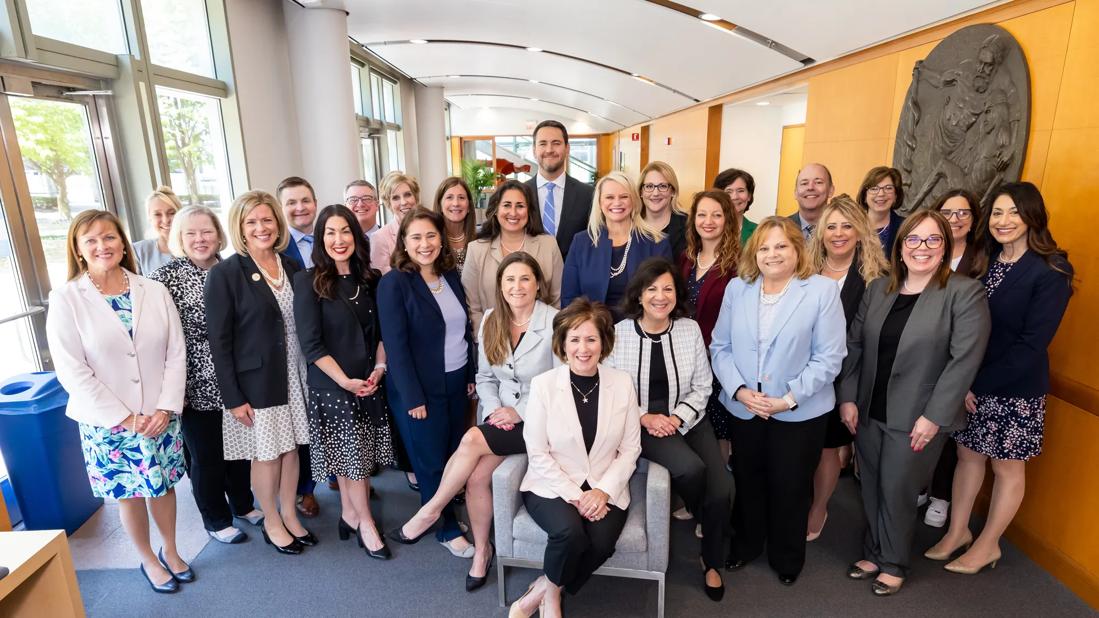Pandemic underscores need to convene to support each other

By Meredith Foxx, MSN, MBA, APRN, NEA-BC, Executive Chief Nursing Officer
Advertisement
Cleveland Clinic is a non-profit academic medical center. Advertising on our site helps support our mission. We do not endorse non-Cleveland Clinic products or services. Policy
With more than a year and a half of the COVID-19 pandemic behind us, nurse leaders at Cleveland Clinic are looking at the road ahead. And what they see is a need to reset and reconnect with their teams.
Following what has been an exhausting 1.5 years, nurse managers (NMs) and assistant nurse managers (ANMs) across the health system are focused on bringing teams back together to support current caregiver needs.
To aid nurse leaders, Cleveland Clinic’s enterprise-wide Nursing Retention Council is stepping in. The council is chaired by Fairview Hospital Chief Nursing Officer Mary Beth Thoburn, MBA, BSN, RN, NEA-BC, and encompasses more than 30 nurse representatives from throughout the health system, including chairs and co-chairs of each hospital’s local retention committees.
Before the pandemic, the council, which was established in 2016, was embarking on an effort to reinvigorate its purposeful work to promote and improve retention of nursing caregivers. While retention remains at the center of the council’s work, today, it is helping leaders reconnect with their teams and address challenges that have resulted from the pandemic, such as staff burnout, staff moral distress situations, and an increasing need for recruitment of registered nurses (RNs) and patient care nursing assistants (PCNAs).
In partnership with Cleveland Clinic’s Caregiver Office, including human resources (HR) and the Global Leadership and Learning Institute (GLLI), some of the manager-driven initiatives the council is encouraging are employee stay interviews and skip-level meetings, as well as manager support sessions.
Advertisement
Stay interviews and skip-level meetings offer helpful insight and important feedback from a team’s caregivers and can be conducted by the managers themselves or by a non-bias third party representative, like someone from HR.
Stay interviews
One-on-one stay interviews allow managers to listen to individual caregiver needs or concerns, acknowledge them, and talk through different solutions or support gaps. They also provide an opportunity to gather feedback about current actions that caregivers deem successful or beneficial. The goal of a stay interview is to assess an employee’s current feelings about their job, team, and organization.
Viewed as critical support tools during times of complex change, stay interviews are ideal for any nurse leader in today’s healthcare climate. Examples of interview questions leaders can ask nurses include:
From the interview, leaders should reflect on what they learned about the employee, what is or is not working well for that person and what tools and equipment they need to do their job. It is also important to look for common themes across caregivers and develop focused action plans around them.
Advertisement
Skip-level meetings
Skip-level meetings help build team trust by creating direct communication between unit RNs and PCNAs and upper leadership. These meetings are led by the manager and include all members of the nursing caregiver team, as well as the nurse leaders to which the manager reports (i.e., nurse directors). By increasing access to higher level decision-makers, these meetings are intended to encourage caregivers to better communicate their personal challenges and needed support.
Managers can use the following tips to lead a skip-level meeting:
Leaders should make connections using personal and professional stories, appropriately balance inquiry with advocacy, and provide team members the opportunity to influence with open-ended questions. It is also important to follow up on requests and questions that weren’t answered in the meeting.
Another initiative the Nursing Retention Council introduced is manager support sessions. These are informal group conversations for novice and experienced nurses to discuss how management can best support the nursing team. Sessions can be held as frequently as the leader deems appropriate.
Advertisement
For example, one nurse manager at Cleveland Clinic Fairview Hospital rotates sessions every other month, meeting with novice nurses one month and experienced nurses the following month. Sessions are held from 6-7 a.m. with in-person or virtual attendance options.
Examples of discussion topics and questions managers may ask during novice nurse sessions include:
Managers also ask questions and discuss actions related to unit processes, policies, or care scenarios. For example, a patient needs non-violent restraints. What does the process look like? How do you document this? Who needs to be notified?
In experienced nurse support sessions, good questions for leaders to ask include:
Advertisement
It is beneficial for managers to also glean insight from experienced nurses on education, recommended refresher courses/meetings/classes or competencies, respect and professionalism and specific areas of success or improvement.
Although the Nursing Retention Council’s suggested initiatives have just started being implemented throughout health system nursing units, initial feedback from NMs and ANMs has been positive. In addition to addressing current caregiver support needs, the council expects the manager-driven initiatives will also help boost employee engagement and retention.
Advertisement

Advanced software streamlines charting, supports deeper patient connections

How holding simulations in clinical settings can improve workflow and identify latent operational threats

Interactive Zen Quest experience helps promote relaxing behaviors

Cleveland Clinic and IBM leaders share insights, concerns, optimism about impacts

Cleveland Clinic partners with Palantir to create logistical command center

A Q&A with organizational development researcher Gina Thoebes

Cleveland Clinic transformation leader led development of benchmarking tool with NAHQ

Raed Dweik, MD, on change management and the importance of communication